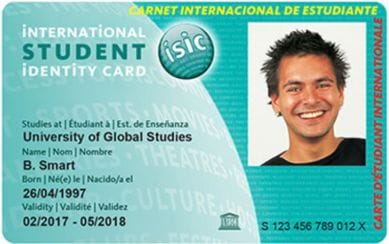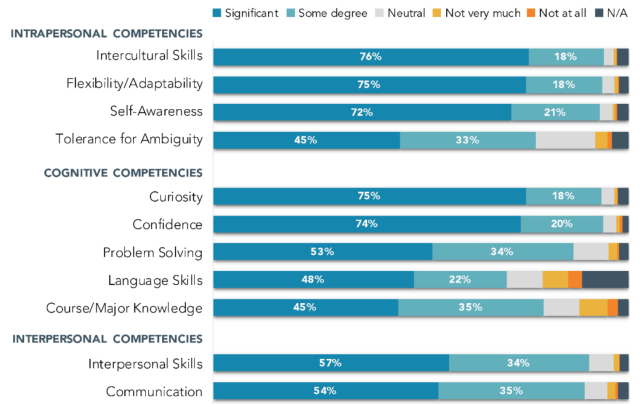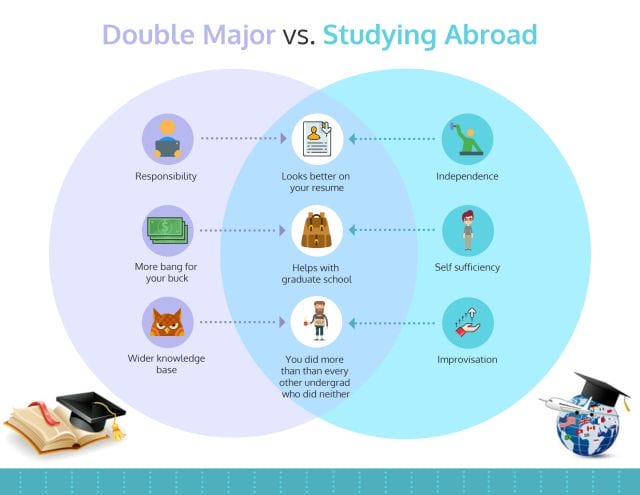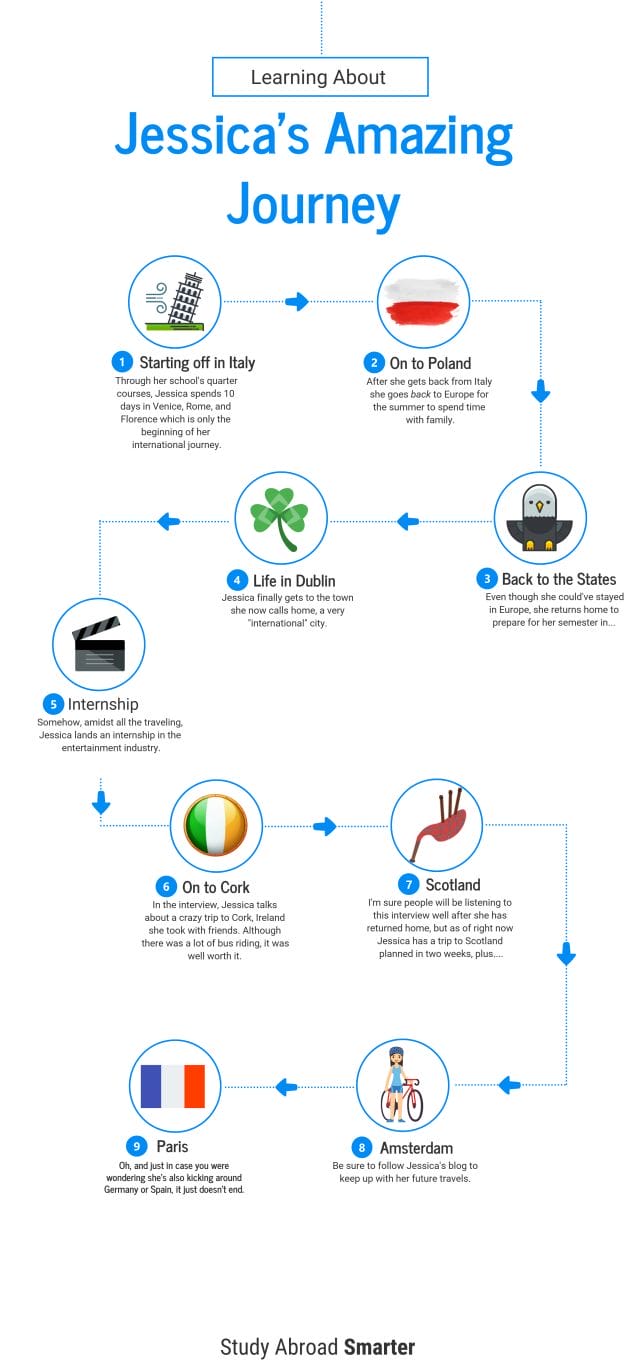The journey is just as important as the destination
*Nick Trefelos is a good example of this. He actually decided to study abroad in northern Italy because of its proximity to other countries and cities.
———
One of the best and most memorable aspects of studying abroad is the opportunity to explore every nook and cranny of your host city, the surrounding region, and other nearby countries on your “must-see” list. After all, this is your once-in-a-lifetime adventure and you shouldn’t miss visiting every iconic landmark and exploring every scenic destination that you can.
That means you’ll need to know exactly how to get from Point A to Point B in a foreign country. Depending on the international program you choose, you may be allowed to select any mode of transportation for getting around. Or you might be required to travel as a group by a certain method. Or maybe you’ll be able to get from place to place by using a combination of several transportation options.
To make the right choices and travel around as safely, efficiently, and cheaply as possible, all it takes is a little advance research. I call it the know-before-you-go approach. And it’s a must.
The Ultimate Weekend or Week-Long Trip
Practically anywhere you study abroad, weekend excursions will be in your plans. When you don’t have to study for a major exam or have a big paper to write, you may even opt for a longer multi-city or multi-country trip. By following a few simple guidelines, these trips will be totally awesome, memorable, and virtually hassle-free for you.
How to Get There:
1. FLY 🛩

Check out low-cost carriers. Ok, so they might not be the most comfortable, but the money you can save makes them so worth it,
especially for a short jaunt. It’s best to book as far ahead of time as you can, but it’s ok with many airlines to book pretty much up to the day before departure.
If you go with a low-cost carrier, keep in mind that they usually fly to airports that are outside a city center (possibly 30-45 minutes away). In that case, you’ll need to take a taxi or use a shuttle service which often is provided by the airline and often is free. Or check out bus and train airport link routes. These are a snap to hop on – especially if you’re only carrying a backpack – and are really cheap.
Taxi or Uber: Taking a taxi or your continents version of Uber usually is the most convenient and time-effective option, but also the most expensive. Having a travel companion(s) to share the fee will help. But whether you’re alone or with friends, be smart about using a taxi as many drivers charge tourists a ridiculously inflated rate (yes, you’ll probably be considered a tourist). To prevent this from happening, don’t be afraid to negotiate either a price per mile or an overall rate right when you get in the cab. And stick with it. Otherwise, seek out an official airport taxi with fixed rates.
Most other lower-cost transportation options available to you will be great, so you might want to save taxis as a last resort. Read on…
Shuttle: Airport shuttles take multiple passengers to and and from the airport to their destinations or to specific pick-up/drop-off locations. While less expensive, this service usually will eat up a lot more of your time depending on the number or riders and where you’ll be dropped off. Some shuttle companies require advance reservations, but most will take you on the spot. There also may be added fees if you have extra bags.
Train: If the airport is far from your destination city, consider using its express train service for a ride directly to the city center. You might then need to take a taxi or other transportation to your door, but that’s easy enough once you’re there. Other regional or local trains may service the airport, as well, but could require changing trains in order to get where you want to be.
2. TRAINS 🛤
In many countries, particularly in Europe, train travel can get you practically anywhere with schedules that feature frequent departure times. It’s not always necessary to book your ticket in advance, although that would be a smart way to ensure your spot. Plus you can save a lot by doing so.
Note: In the UK and Europe, if you book online with a credit card, you’ll need to have that card in hand when you pick up your  at the station.
at the station.
Train Links
- Britrail (British Student Rail Passes available)
- Eurail Pass (Europe)
- Eurostar (London, Paris, Brussels)
- Rail Europe
- Railpass Information
- Trenitalia (Italy)
- Japan Rail Pass (advance booking required)
3. COACH TRAVEL 🚌
Long distance coach travel is available in many places, usually at a very reasonable cost. BUT, do your research on this one. Road travel in some countries, particularly developing ones, can be dangerous and students are advised to use an alternate means of transportation. The same holds true for road travel in a car, including rentals and carpooling.
- Bus Links
- Megabus (Europe)
- Long and Medium Distance Bus in Japan
Now that You’ve Arrived…
Congratulations!
You’ve made it to the destination of your exciting side trip. No doubt you’ll want to see all the attractions you can. Some may be relatively close to one another, but some may require a trek to the other side of town, or an outlying area. Of course, the cheapest way to see and do it all is on foot. Plus, walking allows you to actually do a little exploring along the way. But, do you really want to spend all your precious time hoofing it from place to place? I don’t think so. It will take far too long and you’ll ultimately end up missing a lot. Not to mention having some mighty sore feet at the end of the day.
So what are your local transportation options?
1. TAXI 🚖

This wasn’t high on our list for getting from the airport to your door. But once you’re at your home base and want to get out and about, it’s a pretty convenient option – although depending on traffic if you’re in a major city, your ride just might take as long as walking. And it still will be on the expensive side cost-wise. Remember what I said earlier about setting the price when you get in the cab, rather than at the end of the ride. Do this and stick with it. And make sure the cabbie sticks to it, too.
A Few Exceptions to the Expensive Cabs:
- If you’re in Asia, some places feature very inexpensive taxi service
- If you’re in a city like London where the taxis are famous, go ahead and take a short ride just for the experience
- If you happen to be in Belfast, don’t miss their famous black taxi tours
At some point, it probably will be necessary for you to use a taxi. Before departing from your home city, it’s important that you use the country-specific information on the U.S. Department of State and other resources to research ways to identify legitimate taxi companies in your host country.
2. SUBWAY, TUBE, METRO, TRAM/TRAIN/BUS 🚍 🚝
👉 I wrote about how studying abroad in a big city can prepare you for big city life, and I’d recommend you read it if you’re planning on moving to one after you graduate.

All of these transportation options are quick, efficient, safe, and NOT expensive – a winning combination for budget-conscious students. Hop on any one of them and you can get just about anywhere you want to be. No need to miss out on a special attraction you’re dying to visit just because it costs too much to get there.
In many major international cities, transit services offer passes for unlimited rides for a fixed length of time like a day, week or month. In some places, you can even buy an all-inclusive transit ticket, good for most of the modes of transportation. This is a super bargain so check out the availability in your destination city! You’ll be able to take in a huge assortment of museums, local attractions, and iconic landmarks, and discover some pretty amazing eating and drinking spots, for not much cash – probably less than $10.
Here’s another insider tip: Look into group rates. They’re a bit more obscure and are not offered everywhere, but provide good discounts if you’re traveling with a few other people. Munich, for example, is a city where group rates are available.
Don’t Do This!
One of the biggest mistakes study abroad students make is not researching the modes of transportation available to them. I know of a student who headed out with friends to see the sights in their host city, but had no idea how to navigate their way around. They ended up walking everywhere and it took them three hours just to reach their first destination. Don’t be that student.
Avoid a time-wasting scenario like this simply by researching your transit options first. Check flyers and timetables. There are even online sites that can acquaint you with things like metro routes and stops before step outside your door.
3. BIKE 🚲

Many countries around the world have super bike-oriented cultures that feature well developed bike lanes and access. If you find yourself in one of these locales, consider renting or buying a bike for getting to class and around town, or to supplement a public transit pass. You’ll be able to move about easily, on your own time schedule, with the added bonus of a little built-in exercise.
4. TOURS
No, they’re not just for retirees. Guided tours are a perfect way to not only visit specific attractions, but to learn about them and get the inside scoop on landmarks, buildings, neighborhoods, etc., along the way. You might say this is a great two-fer, three-fer, four-fer deal! With no worries about how to get there, what to do when you’re there, and how to get back home. All you have to do is enjoy the sights.
Most major cities even offer name-your-own-price tours. As you can imagine, they’re extremely popular. You go on the tour, which has no specific cost and, depending on how you think it went, tip the tour guide accordingly at the end.
Of course, if you opt for one of these tours, please remember it’s your guide’s livelihood and offer a reasonable fee. To help you gauge a fair price, most organized guided tours typically cost $15-$25. So no matter what price you decide on, you’re likely to save a bundle.
Travel Smart
During your time abroad, you’ll want to squeeze in as many awesome adventures and experiences as you can. Don’t worry about how you’re going to make them happen. All it takes to accomplish this is a little pre-planning and you’ll be good to go.
LET’S RECAP
Do your research ahead of time. Keep an eye out for airfare discounts and book cheap flights to your host city, as well as for weekend or extended week-long excursions. You can set up alerts on sites like Hopper or skyscanner, with the optimal time to purchase flights being Tuesdays around 3:00 pm EST. Doing this 50 to 100 days before your departure date is best, if possible, and could save you big bucks on costly flights.
Familiarize yourself with the transportation options that are available wherever you are. For the most part, public transportation is the cheapest way for international students to get around. Plus, it’s safe and efficient. So learn the local systems and use them to save money. Most importantly, do your research and always use good judgement when selecting the transit modes you use.
It goes without saying that you also can ask local students about the kinds of deals they use that you might take advantage of, too. As the saying goes, “When in Rome, do as the Romans do.”
Get an International Student Identity Card. For Sure.
Before you take off for your exciting international experience, be sure to purchase an International Student Identity Card (ISIC). Most study abroad students are required to do this and, depending on your program, it may automatically be included in your fees. Because the card opens the door to so many opportunities for exploring culture, food, and attractions, it will help make your study abroad visit easier and less expensive than you imagined.
The ISIC card is accepted globally and will provide significant savings for you on things like groceries, books, admission to museums and other attractions, entertainment, budget hotels, hostels, AND transportation – around 160,000 discounts in all – in more than 130 countries. Discounts vary by locale, but to give you an idea of the savings in store for you… you might enjoy city tours for a lower price than the general public, or save a sizeable amount on a cross-country European trip when traveling by rail, bus, or airplane.
Or you can take a bus across Europe for 15 percent off. And how does this sound: island-hop between the Greek isles with 50 percent off ferry tickets. Sweet! Even in the likelihood that you’re flying through Europe and your chosen airline goes bankrupt while you’re traveling, you’ll receive a 100 percent refund on the ticket. There’s a discount finder tool on the official ISIC website, but you might also discover a surprise deal you didn’t know about by showing your card at certain attraction sites like:
- Sandeman’s NEW Europe Tours (Europe)
- Nationale Opera and Ballet (Amsterdam)
- Rock ‘n Roll Museum (Dublin)
- Musée du Louvre (Paris)
- Churchill War Rooms (London)
Here’s another awesome perk. Your ISIC card includes basic travel insurance. Let’s say you need medical attention in Europe or have an accident while touring. The card will automatically cover up to $2000 of your bill.
And, what if a venue doesn’t accept your ISIC card? It could happen, particularly in an outlying area. There’s still no need to worry because, in that case, you’ll be reimbursed for the extra money you paid.
‘Nuff said about the ISIC card. I think you get the idea. Especially if you’ll be travelling in Europe, get it!
Happy, Safe Travels!
It’s exciting to think of all the fun travels you’ll have while studying abroad. Follow the guidelines above and they’ll be some of the most memorable, fulfilling experiences of your life. Whether you’ll be in a bustling international metropolis or a small quaint rural area, this is your time to include some extra adventures and explore the rest of the world around you. Go for it!


 so many financial aid
so many financial aid 



 essentially, open your eyes to a different way of viewing the world. Depending on the program you select, you also can acquire hands-on professional experience (think local job or internship) and make priceless contacts that will help with your career after graduation.
essentially, open your eyes to a different way of viewing the world. Depending on the program you select, you also can acquire hands-on professional experience (think local job or internship) and make priceless contacts that will help with your career after graduation.
































